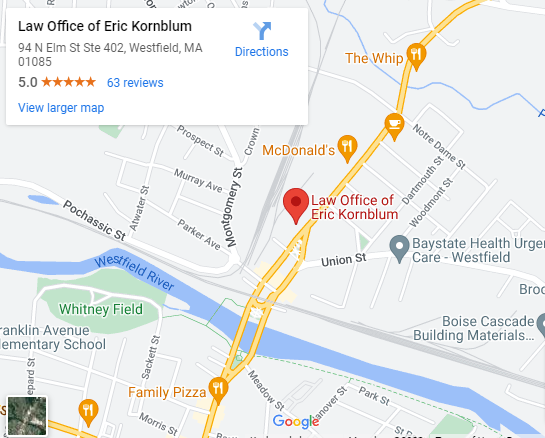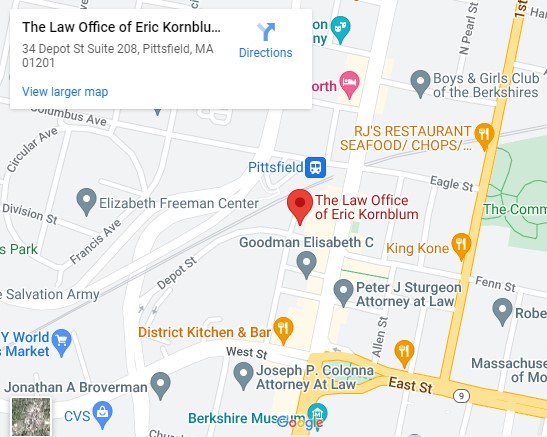Get debt discharge through Chapter 13 bankruptcy to wipe away your debts
Navigating the labyrinth of financial difficulties can often feel like an impossible challenge. Dischargeable debt, through Chapter 13 bankruptcy, could be the best solution if you’re wrestling with mounting debts and searching for a way to regain control of your finances.
Are you ready to take control of your financial future and learn more about how Chapter 13 bankruptcy can work for you? Reach out to the Law Office of Eric Kornblum today, and let’s explore the options that can help you find relief from your debts. Your financial fresh start begins here. Schedule a conversation with our credible Springfield bankruptcy attorneys to discuss your case.
What is Chapter 13 Bankruptcy?
Chapter 13 bankruptcy is a legal process in the United States that allows individuals with a regular income to create a structured repayment plan for their debts, typically over three to five years.
Unlike Chapter 7 bankruptcy, which involves liquidating assets to pay off creditors, Chapter 13 enables debtors to retain their assets while consolidating and repaying their debts. Individuals often choose this form of bankruptcy to protect their homes from foreclosure, catch up on missed mortgage payments, or manage their debt more effectively.
Chapter 13 provides a court-approved plan that allows debtors to regain control of their finances while working toward a debt discharge upon successful completion of the repayment plan.
Which Debts Get Paid in Chapter 13?
Since a debtor creates a repayment plan to reorganize and pay off their debts over three to five years in Chapter 13 bankruptcy, certain debts receive priority and must be paid in full. However, other debts may be partially paid or sometimes even discharged.
Here’s a breakdown of the main categories of debts and how they are treated in a Chapter 13 repayment plan:
- Priority Debts: Priority debts are typically non-dischargeable and must be paid in full through the Chapter 13 plan. These debts include:
- Child Support and Alimony: Any unpaid child support or alimony obligations are considered priority debts and must be paid in full.
- Tax Debts: Certain tax debts, such as recent income tax liabilities, are considered priority debts and must be paid in full. Depending on specific circumstances, older tax debts may be treated as non-priority unsecured debts.
- Domestic Support Obligations: Other domestic support obligations, like property settlements, are also prioritized.
- Secured Debts: Secured debts are debts secured by collateral, such as a house or a car. In a Chapter 13 plan, the debtor can propose to keep the collateral and continue making payments on the loan, typically at a reduced interest rate. If the debtor wants to keep the collateral, they must pay off any arrears (past-due amounts) over the plan’s duration.
- Unsecured Priority Debts: Some unsecured debts are prioritized and must be paid entirely over the plan. These debts may include certain tax obligations and non-dischargeable debts from prior bankruptcy cases.
- General Unsecured Debts: Most unsecured debts, such as credit card debt, medical bills, and personal loans, are categorized as general unsecured debts. These debts are typically paid based on what the debtor can afford after covering priority and secured debts. In some cases, general unsecured debts may receive only a portion of what is owed and any remaining balance may be discharged at the end of the repayment plan.
Consulting with our experienced bankruptcy attorney is essential to understand how your specific debts will be treated in a Chapter 13 bankruptcy case. The Chapter 13 plan is customized to your financial situation, and the goal is to create a manageable repayment plan while relieving some unsecured debts.
Debts That Qualifies for a Chapter 13 Discharge
Chapter 13 bankruptcy offers individuals the opportunity to reorganize their debts and obtain a discharge of certain types of debts at the end of the repayment plan.
Let’s discuss each of the debts mentioned below in more detail:
- Credit Card Debt: Credit card debt is one of the most common types of general unsecured debts that can be discharged in Chapter 13 bankruptcy. That means after your repayment plan, you may no longer be obligated to repay the remaining balance of your credit card debts.
- Medical Bills: Medical bills, like credit card debt, are considered general unsecured debts and are typically dischargeable in Chapter 13 bankruptcy. That can provide much-needed relief to individuals burdened by high medical expenses.
- Personal Loans Not Secured by Collateral: Personal loans unsecured by collateral, such as a car or a house, are also general unsecured debts that may be discharged in Chapter 13 bankruptcy. These debts are usually treated similarly to credit card debt and medical bills.
- Older Tax Obligations: While recent income tax debts typically cannot be discharged in Chapter 13 bankruptcy, older income tax obligations may be eligible for discharge if they meet specific criteria. The tax debt must meet conditions like the tax return being due for at least three years and filing for at least two years before filing for bankruptcy.
- Breach of Contract or Negligence-Related Debt: Debts arising from breaches of contract, negligence, or other civil judgments may be eligible for discharge in Chapter 13 bankruptcy, provided they are not associated with fraud, intentional wrongdoing, or other non-dischargeable factors.
Understand that not all debts are dischargeable in Chapter 13 bankruptcy. Some debts, such as child support, alimony, certain tax debts, and recent tax obligations, cannot be discharged and must be paid in full through the repayment plan.
Why Do I Need a Bankruptcy Lawyer?
Hiring our bankruptcy lawyer from the Law Office of Eric Kornblum, even when seeking dischargeable debt in Springfield, MA, is highly advisable for several reasons:
- Legal knowledge and Guidance: Bankruptcy law is complex and subject to change. Our experienced bankruptcy attorney has in-depth knowledge of the law, court procedures, and local rules, which can be crucial to ensuring your case proceeds smoothly and that you follow all necessary legal requirements.
- Tailored Financial Assessment: Our bankruptcy lawyer can evaluate your financial situation and help you determine if Chapter 13 is the right choice for you. We can assess your income, expenses, assets, and debts to create a repayment plan that is realistic and manageable.
- Repayment Plan Development: Crafting a compelling Chapter 13 repayment plan that meets court approval can be challenging. Our attorney can create a plan that maximizes the discharge of unsecured debts while ensuring you can meet your obligations under the plan.
- Legal Protection: Our lawyer can help protect your legal rights and advocate for your interests in court. We can address any objections or disputes during the bankruptcy process and work to resolve them in your favor.
- Debt Discharge Maximization: Our bankruptcy attorney will work to maximize the discharge of eligible debts, ensuring you get the full benefit of Chapter 13 bankruptcy. We will identify which debts can be discharged and help you understand which obligations remain after bankruptcy.
- Documentation and Paperwork: Bankruptcy involves a significant amount of documentation and paperwork. Our lawyer can help you gather the necessary financial records, complete the required forms accurately, and submit them to the court on time.
- Negotiation with Creditors: Our attorney can negotiate with creditors on your behalf, potentially reducing the amount you owe or arranging more favorable repayment terms for certain debts.
Call our Bankruptcy Attorney to Know More About Dischargeable Debt in Springfield, MA, Now!
Let our experienced bankruptcy lawyer help you navigate this process effectively and increase the likelihood of a successful discharge of debts and a fresh financial start. Consulting with our attorney is an investment in your financial future and can save you time, money, and stress in the long run.
We also offer bankruptcy-related legal services such as debt negotiation, bankruptcy exemptions, stopping foreclosure, and rebuilding credit after bankruptcy.
Ready to take control of your financial future? Contact the Law Office of Eric Kornblum today! Our experienced team is here to guide you through the complexities of bankruptcy and help you find relief from your debts. Don’t wait – start a conversation with us now and start your journey toward a debt-free tomorrow.

 MA bankruptcy lawyer Eric Kornblum graduated from State University of New York, Binghamton in 1989 and received his law degree in 1992 at Western New England College, School of Law. Since opening his own practice, Eric has been dedicated to helping his clients resolve their financial problems both in and out of court.
MA bankruptcy lawyer Eric Kornblum graduated from State University of New York, Binghamton in 1989 and received his law degree in 1992 at Western New England College, School of Law. Since opening his own practice, Eric has been dedicated to helping his clients resolve their financial problems both in and out of court. 
